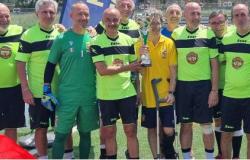Share this article
Advertising
It took place in the town hall on the afternoon of Tuesday 11 June the delivery of the Trentino historic shop plaques to the Maffei pizza restaurant and Rigatti Stufe.
To hand out the plaques, the mayor Cristina Santi and the councilor for economic activities; to collect them, for the Maffei Matteo Benini pizzeria restaurant, for Rigatti Stufe Piergiorgio Rigatti.
To obtain the title of Trentino historic shop, the business must have been operating for at least fifty years nthemselves local and in the same product sectoror in similar sectors, regardless of any changes in name, brand, management or ownership, provided that the original characteristics of the activity have been maintained.
Advertising
This requirement may be subject to an exemption in the case of transfer to other premises in the city, provided that the product or service characterization remains unchanged.
Furthermore the presence in the premises of elements, tools, equipment and documents of historical, artistic, architectural, environmental and cultural interest is requiredor particularly significant for the tradition and culture of the place.
From the mayor and councilor, congratulations on this recognition which rewards the commitment and dedication that have continued for entire generations, and which recognizes the city’s value in activities deeply rooted in the community and its history, conducted with skill and passion: two examples to look at with admiration.

The Maffei pizza restaurant
In 1967 the Rivan entrepreneur Valerio Benini opened the Spaten Brewery, thanks to an agreement with the importer of German beer Spaten, and offered typical Bavarian cuisine. The restaurant, which becomes a meeting and conviviality place in the heart of Riva del Garda, is located inside Palazzo Menghin-Brezburg, a late seventeenth-century building in Piazza delle Erbe which owes its name to Baron Luigi Menghin, a native of Brez in Valle di Non. Originally on the ground floor, where the restaurant is today, the carriages of the baron’s guests entered, the horses found shelter in the stable, while the servants and postillions slept in the adjacent house.
The stone tracks are still visible and make up the floor of the current restaurant. The small family chapel still exists, now deconsecrated and used as a restaurant room, where the plaque commemorating Luigi Menghin and the dynasty up to his paternal grandparents is walled up, in addition to the family heraldry visible on the ceiling. At the end of the seventies, the three sons, who had just graduated from the hotel school in Varone, joined their father Valerio: Leonardo, currently a chef; Raffaello, who takes care of the pizza; and Matteo, who manages the room. In the meantime, the cuisine abandons the classic South Tyrolean features and becomes contemporary and Italian. In 2000 Valerio passed away and the management of the restaurant passed to his children, who in 2005 replaced the Tyrolean furnishings with a contemporary one, made various changes and changed the name to the current one: Ristorante Pizzeria Maffei (in homage to the illustrious poet and translator born in Molina di Ledro).
At the end of the 2000s the external stalls were added and in 2012 an artist embellished the vaults of the building with decorative paintings, restoring the original frescoes which can still be admired inside the rooms, such as the original wooden heraldry or the stained glass window depicting the Madonna in the chapel, now deconsecrated. In recent years, the grandchildren Samuele and Vanessa (Leonardo’s children) and Mattia and Valerio (Matteo’s children) have joined the management of the restaurant.
The Rigatti Stufe
The Rigatti company has existed for three generations and Piergiorgio still dedicates his life to the production of majolica stoves. Founded in 1860 with the name Perini, it was already building majolica kitchens and stoves which were transported along the dirt roads with carts or via the lake with special boats. The company was purchased by the Rigatti brothers, who were already working within the company; they were the difficult years of the 1929 crisis, but the difficulties did not prevent them from making the business grow and prosper. It was Luigi Rigatti, in particular, who believed in the development of the company; it was 1943 when he rented the laboratory-shop at number 61 viale Dante, the company’s historic headquarters.
Luigi Rigatti was a man of great personality, an old-fashioned figure, a lover of his work, a precursor of his times; he was responsible for the patent for the construction of cast iron radiant plates, the patented Cucine Rigatti brand, and the intuition of a high-performance hearth for wood-fired “economic cookers”. During the post-war years he understood the importance that tourism would assume in Alto Garda, and he began to build and install kitchens for trattorias and restaurants. His son Piergiorgio took over from his father first as assistant and then as owner. Today the shop-shop on Viale Dante represents a point of representation for customers.

Advertising









